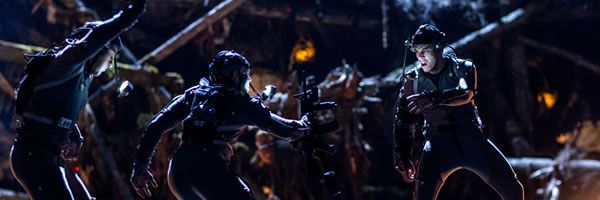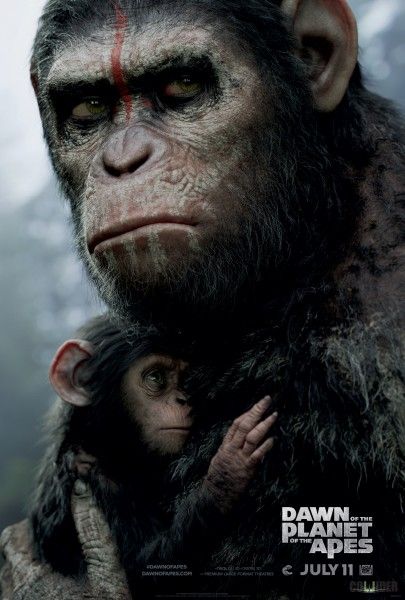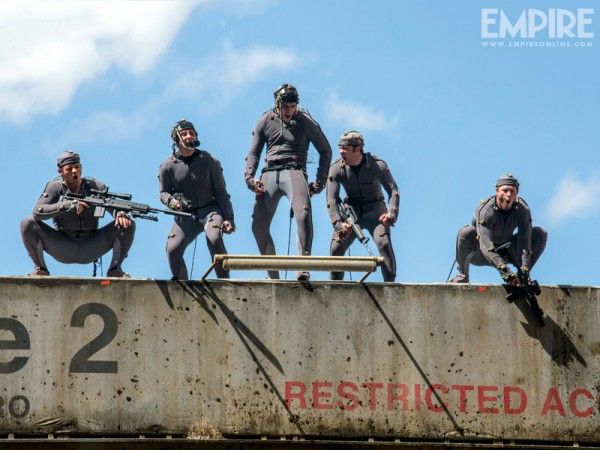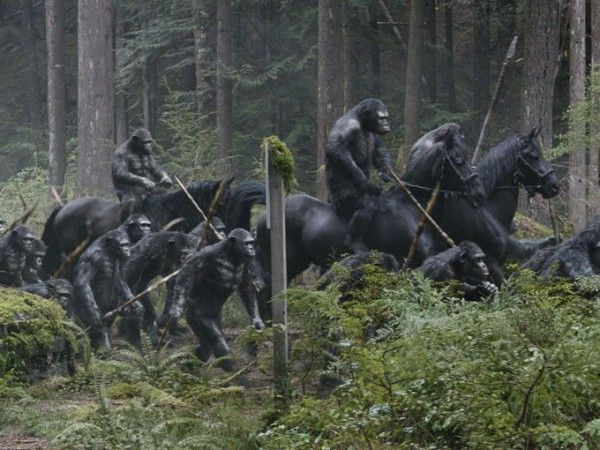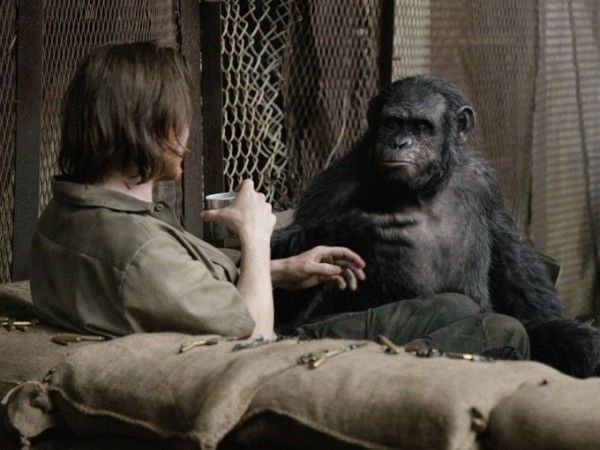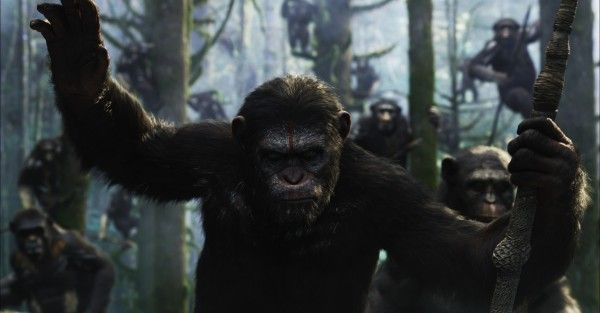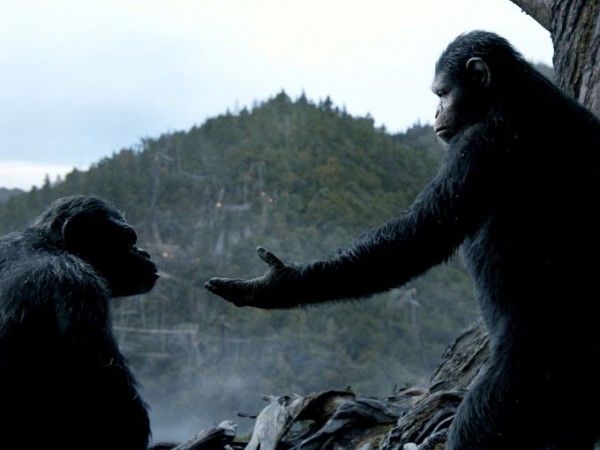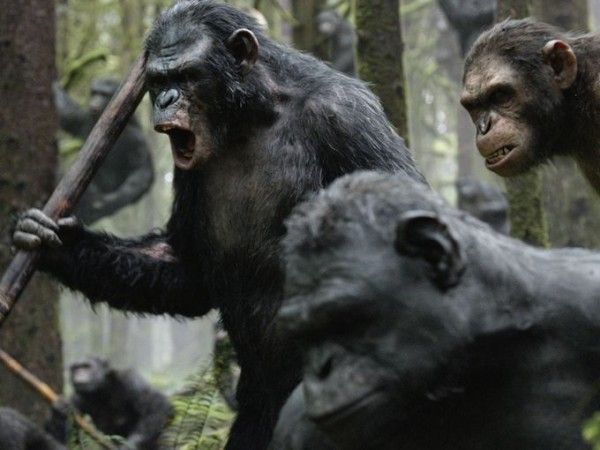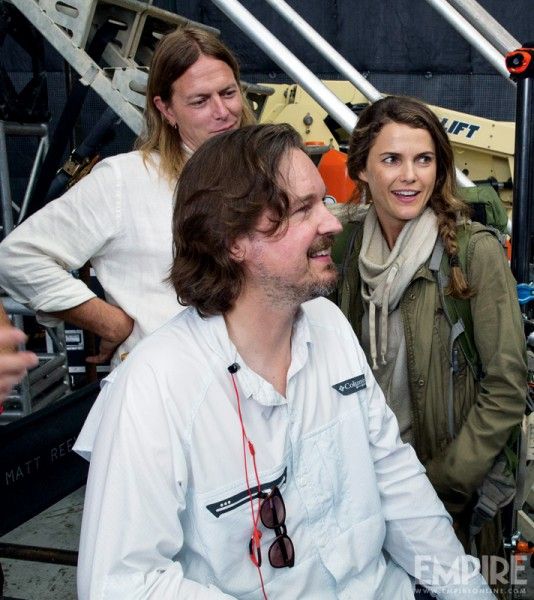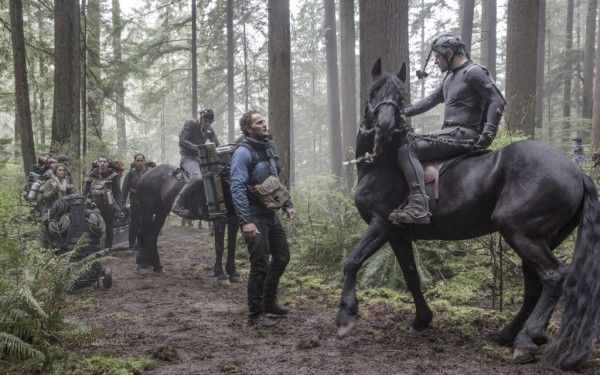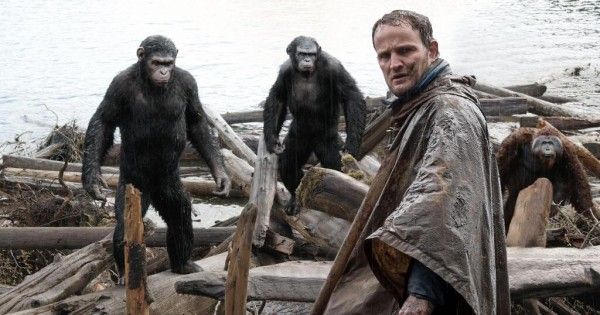In director Matt Reeves' Dawn of the Planet of the Apes, Toby Kebbell plays Koba, who is Caesar's (Andy Serkis) trusted adviser. While Rise of the Planet of the Apeshad Koba played by Christopher Gordon (one of the stunt team), due to Koba's expanded role in the sequel the team decided to bring in an experienced actor to take over the role.
While on set, I participated in a group interview with Kebbell. He talked about landing the role, what the auditioning process was like, the background of his character and where the apes are at in the sequel, how his character doesn't trust humans, filming in 3D, how the production is mostly on location, working with Reeves, and so much more. Hit the jump for what he had to say.
Before getting to the interview, if you haven't seen the Dawn of the Planet of the Apes trailer, I'd watch that first:
Could you talk a little bit about your hand things?
TOBY KEBBELL: My fists? These are the Cross Gloves, I adapted them. I don't know if I can say that, because the company will be like 'well we invented them'....But these are the best, cause you need dexterous hands. So you want a hand that's dexterous, but then at the same time you need to be able to quad on your fist, and it just tear your hands up when you quote it. So when we practice it out there in the concrete obviously, but also inside the what we call the tank, where we do the motion capture reel, it just tears up your hand you know.
Are you the only one using these?
KEBBELL: I'm the only one today, I found them in the weekend. I literally found them this weekend. We tried all kinds of different things. So today is the test.
Talk a little bit about getting on this project. Have you seen the first one?
KEBBELL: I was a massive fan of the first one. I was working in London, and I got an audition for it so I had to pretend I had an dentist appointment to come to the audition cos I was playing a lead on a three part drama. So I pretend I had a dentist appointment and I met Andy, I was very nervous, because he's awesome. And we went to his place in London called Imaginarium, where we did a screen test. A kind of motion capture screen test. We put on a suit, and I did two scenes with Andy. Sort of short you know, basically, wasn't...I have no class but for some reason, he thought I would be fun to work with. So yeah I was blessed.
Did he give you any advice before?
KEBBELL: No, that's what nice about him, he just said look it's more like theater than...you know film acting, you know we are gonna get the same opportunities we do with film acting. Shooting it over and again until everyone feels like it's right, but it's very much like theater it's a complete performance each time and it's large cos it has to capture the performance. So there are subtleties in there because we are wearing a helmet, yeah I'm missing this stupid helmet, this is why I don't bother brushing my hair cos you wear this helmet, a very closed helmet with a camera arm off it sits right in front of your face, losing you 60% of your vision. And a little microphone on it, so it just captures all of you and there is the dot, so what these do is they track all of the subtle movements of the face and then-because apes don't actually speak-we are making groans and making noises, attempting that kind of process. And finding out what they will do cos you know they kind of…they speak with a sign language. I don't know if you have seen Koko? The Ape? The gorilla Koko?
So how do you feel like after shooting with all these after a long day physically and emotionally, mentally?
KEBBELL: It's exhausting, it is. I'm not gonna pretend it's not, I have massive admiration for Terry Notary, who is our motion teacher, for the movement of the apes, and Andy, it shows you how in-depth it is, how detailed it is. I kinda was like 'yeah I can play a monkey, I've seen Roger Rabbit I got it'. It's amazing to experience it and something I didn't...when we started the process I was like 'actually I don't think I can do this', it's incredibly difficult. It sounds like you blow up, but I was amazed, and when you watch Andy do it, and Terry, they figured out all these subtleties of the way they move, it's phenomenal. But at the end of the day you’re wiped out.
Can you tell us about your character?
KEBBELL: He's Koba, and Koba was in the first one. Played by an awesome stunt guy [Christopher Gordon], but this time with the performance capture cameras, they wanted more interactions between Caesar, Andy's character and Koba. So it's the unity the family that lives together, we are sorta family of apes now. After that...apocalypse? Is that fair word? Yeah the human apocalypse sort of deal? The gardeners obviously left you can tell from there.
What's his relationship with Caesar?
KEBBELL: I'm not his right hand man but I'm certainly like his trusted adviser on how we should grow our community and what we need and....the army, yeah I'm allowed to say that.
Do the original generation of apes....
KEBBELL: Survived? I'm sorry I'm just predicting your questions, please go ahead.
Do they interact with each other in a different level than these apes that have been raised post virus?
KEBBELL: Yes, River and Ash, yes they do. You know like all of us when we grow up in a new technological age or anything that's advanced from what it was before, there is obviously more conflict with them and also they have not known anything else so for my character Koba who grew up literally the 30 years in an institution, a medical institution, you know they bred there and they grow up there and that's how they live. So yeah there is a vast difference especially between my character and what I consider my nephew, River, Caesar's son, his first born, he has another child on the way. But I feel very responsible for making sure that the other apes are aware of just how foul humans can be. He is like the old story teller you know what I mean? But at the same time we hunt, we're going on a hunt. I think Koba is very much putting himself in that position where it's like the structure, so the gorillas live in that nest at the base of our camp and the orangutans they live in a higher grounds, they are gathers, they work on that kind of work and of course Maurice from the first one is there with us. This time played by Karin who is awesome.
Would say this had led to some prejudice for your character?
KEBBELL: Yeah 100 percent, yeah Koba is totally prejudiced, I despise all humans. Definitely so, I find him repulsive. There is a beautiful thing on YouTube, you guys are very busy so I don't know if you have time to watch it, but there's one in Louisiana and there's one in Germany, where they let the apes that have been in captivity their entire lives out for the first time, and it's hard to watch but it's beautiful. Some of them forgot how to quadruped so they were using their arms like crutches, they were just swinging themselves through. They are looking at the sky and they can't quite comprehend it, and all their behaviors slightly twisted. So I use that kind of mentality rather than just make him like the evil, you know what I mean? He is not that at all. He is very much a part of this ape family. He just has a responsibility he feels to let everyone know that humans are not to be trusted, which I feel like my peers, Caesar, Rocket, Maurice they know and understand.
But you have to pass that on to everyone.
KEBBELL: Yeah and I do it in a very angry way, most of the time.
Your character wasn't with those characters in the first film, right?
KEBBELL: Not until right at the end.
So is that reflected on the relationships ten years later? Is there a feeling of separation at all?
KEBBELL: No, and that's due to Caesar. That's down to what we've discussed during the rehearsal, that's very much down to Caesar creating a family, so that's why I keep referring to it as such. Because it does feel that way you know, we are...it's not like a team, we are like an actual family. We all live and eat together, gather together and spend that time. So that's due to Caesar's work. And that's what he strives tirelessly for.
Speaking of the language, lavishly grunting and the sign language, how much of what you guys have between your interaction is like the real sign language that they have used with apes like KoKo, and how much of it has been created by whoever is responsible?
KEBBELL: Well we are actually in a mix, we are not 100 percent on what we are going to do because what's amazing about apes when you get into studying them, like Andy and Terry have and pass that knowledge on to us. You know you got a lot of time to watch them, the body language is so prevalent, that actually a lot is said before...you know when apes are signing when they are being 'KoKo want water' was like 'yeah I want water', 'YES! WATER!', you know you just like 'they get it', and they do this every day. It's like 'where the balloons?' it's like 'there the balloons!'. You watch them and it's just amazing. So we got that presence, where the conversations we have, plus we are actors so you get all that kind 'imagine staring through each other's eyes for four hours', you know what I mean? So we are doing all that kind of deal. We got that going on, so it's where a conversation is necessary, how much of it, so we are in the process of that right now.
Is that kind of acting makes it hard for I guess like natural moments like improvised moments between the characters, does that limit you to what you can do as an actor aside from what's in the script?
KEBBELL: No, not at all. The script is very good, it's really well written. I mean it's already done by Rupert and then revisions done by our current writer. It's actually awesome, so it's not a great deal you need to improvise. But what's nice about playing an ape is every movement you do is kind of very poignant. So there is a scene involves weaponry and humans, what was vitally important was what was on the page, you know that's kind of what our destination is. Because with actors I know what's written down here feels really goofy, we rehearsed it together just when we waited for them to set it up. And I was like 'oh I get it, it's goofy this is horrible, I understand', so we were kind of like together, all three of us were in the scene came up with something they were very happy with, I was comfortable with. What's nice about that is it can change each time, because in the process of getting to our destination, there was kind of a little playing around with what's happening with the ape anyway, so my character got to be very ape like, and very un-Koba. Because Koba walks with real staunched, hardened face and harden movement cos he is older, and he has been operated on some 400-500 times, no exaggerations to that, it's massive amounts they get operated on.
You guys are filming I believe in native 3D? Talk a little bit about filming in 3D?
KEBBELL: It's an amazing thing to me to discover how it is because I know now there’s been a lot of documentaries about it but I didn't realize the best way to get the two irises is to film them with a mirror. Which is very old fashioned they used to do it in the theatre, so there is a ghost on stage, they would limelight them below stage and mirror them up right. So they have this ghostly presence on stage so it's like right back to this old technology working for new so they have them on top of one another. I know it's hard for the crew, it makes it no different for us. I know it's hard for the crew because those cameras are heavy, and there are two of them strapped together. So it's extra work for them, they are to be praised for that.
Talk a little bit about the first week? I guess the first week you guys, a little slower with those cameras?
KEBBELL: Well they are studio based cameras, so they are not big fans of moisture or dust, and we were in a forest in Vancouver, where it was raining and dropping tree dander onto the camera. It's a super sensitive camera. But that was cool for us, you know like film making is majority standing around.
Something that we learned today was like there was this one scene in the movie on a sound stage and the rest is all outdoors.
KEBBELL: There is one complete scene on sound stage yes, but what we are doing here is that they shoot a plate, what they call a plate, so we kind of get the action of how the scene wants to play out, and then we will go into what I said the tank and we will play out the complete scene again with the cameras heavier so that they can get very finer details on exactly how the movement is. So the sound stage, the environments captured for 3D, we are here at the moment which is the trickiest part, this is something I'm not used to for the other actors to get their performance to have something to react to. So I'm a prop, basically, I'm like a tennis ball on a thing, so it's amazing we get into practice privately as the group of apes, the band of apes, we are practicing exactly what we want to do, we’re recording it down, we write it down as notes for like remember that bit I want to make sure we get that bit in there. Of course the director and everybody else are doing that we just make sure for our movements because like I'm 6 feet 2, as an ape I have to stand here, so you're right down, and that's not even him, that's him, squatting. When he is up, like this high, it's a hip strain, your legs have to get much stronger than mine were. So you kinda have to remember what you need to do in that movement, it's all movement based for us right now.
So basically you are on set right now, you are filming as you said, like a prop, essentially. But at some point in the shoot you guys have to go somewhere and that's where it's really gonna be?
KEBBELL: Yes what we call the tank, which is the motion capture stage, which is a completely green room with 3 tiers of cameras. You have top tier of 15, then you have a middle tier, then you have a low tier. So it captures all of everything. And they’ll build that out of polyester or wood, they will build a cave entrance, or a tree line, or one of these buildings, so we scale buildings, and we will do all of that. Out here, insurance-wise, practicalities...you don't wanna be doing that kind of activity...so they’re kind of like 'now they scale up the wall!' you know what I mean? We run bits of orange tape up of a wall and then we will go into the capture stage and we will gallop up the walls.
How long is that part of the shoot?
KEBBELL: That's a month.
Is that part of the 90 days or separate?
KEBBELL: Separate.
As far as the effects go, how much of them being on the real set is for motion capture reference?
KEBBELL: Everything, we are going to the sound stage for the detail. So here, everything that we react with, the humans when we touch them, when we move to them, when we talk, get to that process of them talking to us and doing all that, that's what's going to be on the film. So we have to replicate that but at the same time all the minutia gets done.
So you haven't done the volume work yet?
KEBBELL: We actually have, our very first shooting in Vancouver was some beginning work for volume. So right at the very beginning, they wanted to make sure everything was what they thought it was. You know they are producing a large film, so myself and Andy, filmed a couple of scenes to send back so that Weta could start working on them technically and show them to the studio and be like 'so this is what we are doing'. Because this is brand new and nobody knows.
How hard it is to match up your performance to something like shooting the same scenes you shot a month before? Do you have freedom there to play with how you doing it?
KEBBELL: To answer your question, how hard is it? I don't find it very difficult because I've been on a large film so I got used to it that's the purpose of these large films, is to learn that experience of you shoot this now in June you are gonna be in a studio again and in September shooting it again. So I've taught myself to have a notebook saying that's what that was. Because the director will come and go 'remember it was a scene and you can be shown a scene but you are watching yourself and your conscious it's not gonna work'. So you've got to really get yourself a tool to figure it out that you can go back and do that. So I don't find it difficult I know for some people it's extremely difficult like 'I don't remember what I did four months ago' , well that's your job, what the fuck are you doing here? And so that's what I've learned from doing these other big feature films so I'm very lucky for that but it can be relatively difficult. But there is an environment created for you to get that memory back, so not really very difficult.
Is there any dissension between the other apes and you as far as your hatred for the humans? Like some of the other apes maybe think the humans are maybe not as bad as you think?
KEBBELL: We won't get too deep into that. But I will answer your question. Caesar was brought up by a human from the first feature, a loving human, someone who taught him a great deal of respect for himself and for other humans. Caesar...it's not like we have a disagreement cos we don't, cos I respect him I admire Caesar, that's the group that's the team. But I have to be told that.........I'm fired.
With regard to Matt Reeves, sometimes with some movies you just jump right in, sometimes you have a lot of rehearsal time. Talk a little bit about the rehearsal process with Matt you know before the production started if you had any.
KEBBELL: Yeah that's what's nice about this is knowing that the tank stuff is right at the end. It means that rehearsal time with Matt was really...we have time day-to-day to say 'so, this scene, this is what I'm thinking, this is like...' 'yeah, show me'. And that's what's nice about film is I now realize that theatre needs rehearsal, we need rehearsal, rehearsal, rehearsal because we are doing a complete performance, film, I can turn up on the day have I done my prep work at home, as he would have done his and turn up and say 'this is my idea for the scene', and we are gonna do this-because of its technicalities-maybe 15 times. So I'm gonna get to do his version, my version, a version for Weta, a version for the props dude...you know what I mean? So we are gonna get to do everyone's version of it. So rehearsal time was never for me and Matt, because Matt...we don't need that you know what mean? Like we are gonna get to do that on the day to perform it. As long as...I think each of other actors who work hard don't go home and party, they go home and work.
Rehearsal time for becoming an ape, as I said, we had 4 and a half weeks? And week one I was terrified, I actually thought I'm never gonna be able to do this, I couldn't get my hips to go down to where they needed to be and move like I could go down there but I couldn't move like...I was like 'I can't do this' but with help, Terry and Andy and the rest of the boys, we got there, it's just muscle memory. But it's intensely hard. I can't explain how impressed you should be with Andy, it's phenomenal.
This isn't meant to be negative in anyway but...
KEBBELL: No, let's be negative.
No...I get the feeling that with Matt directing and also Andy there who so much experience of performance capture is there like two directors when it comes to performance capture kind of stuff?
KEBBELL: You know what? It's funny, weirdly enough, Andy....the short answer is no. But to give some bulk to it..cos I love to talk...what the fuck is wrong with me...I've got to learn how to do interviews...the truth is Terry, he is relied on by Matt, to go 'is that kind of how we would do that?' We kinda have to make sure we do a scene where we arrive somewhere when we all dropped down that everyone is dropping cos we have this thing called ‘selling out’, which is where you come up too high, so out of your stunt you come up too high. It's weird there is this little gap of an inch, two inches where you have sold out into human and you are no longer ape. So our second director, if you like, which is really nice to have, is actually Terry. Andy is awesome because you don't need a second direction from him because when you are doing a scene with him, he pulls you right into what is occurring. But no, Matt is enough of a director for us, but if there was a second [director] it's got to be Terry.
Correct me if I'm wrong but it's not just the physicality it's the emotional space that makes you feel...
KEBBELL: Yeah precisely, that's what's lovely you know, I think that's why they chose actors, I'd like to think that's why, it gives me a nice feeling. Because you know you need the actors to give these emotions that are required. Because it's weird how much goes into it, it's weird that you watch the other boys when they do their ape faces and you’re like...that doesn't read...because what we are doing here in front of you does not read on the skin of the ape. And that's really what we are doing, these affectively light dots that map an ape's mouth, which is why these are higher amount around my enormous lip than everyone else's.
What do you do when lunch, do you take those off?
KEBBELL: No, they don't come off. In this perpetual sweating heat they do not remove. I keep them almost all the time. I don't have a girlfriend, no one wants to hang out with me at night. I go home and pretend to be an ape, I cook some food and I sleep. I'm a dull individual. They are a nightmare, the make-up sucks, taking off your make-up every night sucks. I hated it. All the products? They react to your face and some days you've been eating certain food and you put a make-up on your face and it's like what's that on me? Take it off! It's horrific, make-up sucks, it's all I'm saying.
Do they have a design of your ape look already?
KEBBELL: Yes, well it was in the first film. Koba was in the first film, he is actually older now, slightly more decrepit. He was damaged already, so yeah it's not like just moving like an ape, it's moving like a decrepit ape who has had certain surgeries. He's lost his eye, Koba has one eye.
Is that how his eye was lost? In a lab experiment?
KEBBELL: He lost his eye through a lab experiment. What was nice is reading like what was the back story that isn't official, so I don't know if I can actually say it, so maybe I'm not allowed to say it? But it was his family, they have their family inside this thing. So like your brother would be there, and his brothers...he had three bothers and each one of them died so he is the last of his family and all this kinda...and it's not...it sounds extra sobby , but it's really nice to have information and then watch. Go and see the lab, apes, which there are fewer of now, but it's hard living man, it's hard living, being inside [the lab].
You use the term 'selling out' as far as like the gap between the apes and humans, is that something that just as actors you do or there is mentalities among the apes as characters that they don't want to act more human they keep in touch with their ape groups despite their advancement?
KEBBELL: That's a really nice thought..it's...boringly just actors but let's pretend it is. Because for my character like there is nothing he wants to do with humans. Koba definitely doesn't want anything to do with them. So the gun is a very weird thing for him. Yeah, it's really a very interesting story man.
Why do you think they picked you because you are playing an older ape?
KEBBELL: Because no one wants to see me on film any more... Why did they pick me? I would like to think it was just the audition process, because we all got through these auditions, which you know, woe is us, the world smallest violin and all that business. But auditions are horrific, they are horrific. You go and you give everything you got, you spend 3 days reading these studying these lines...you lie to your own boss 'I've got terrible things with my tooth it's the only appointment I can get'...you turn up and you like 'I've got an hour and a half to do this audition', you break yourself to try and get the audition and you are either lucky or you are not. I feel alright that's it I don't think anyone knew my work beforehand. Andy did, which was nice, and Matt was very pleased, but I just think they wanted an actor, and I think everyone made him what we assume just angry and I didn't see it that way. I don't see Koba is angry, you know when you have a point, and you are certain of the point, and it's just semantics, because it's always just semantics that get your point across. You know, Toby Kebbell is a bad actor, no he is not! He is a crap actor! It's that kind of deal. So that's what I'm doing with Koba.
I was just gonna ask you if there is any talk about where things are gonna go beyond the Dawn of the Planet of Apes in terms of just sitting around with Matt and Andy, do they have a bigger vision of where this universe goes?
KEBBELL: Yeah I mean these are the prequels to what was the 70s' films I guess. But I mean for this franchise, grouping now for Fox? They wouldn't sign another contract for me, so.
Dawn of the Planet of the Apes opens July 11. For more from my set visit:
- 45 Things to Know About DAWN OF THE PLANET OF THE APES from our Set Visit
- Andy Serkis Talks Working with Matt Reeves, Advances in Motion-Capture Technology, and More on the Set of DAWN OF THE PLANET OF THE APES
- Jason Clarke Talks Working with Andy Serkis, His Character's Relationship to Caesar, and More on the Set of DAWN OF THE PLANET OF THE APES
- Cinematographer Michael Seresin Talks Filming in 3D, the Look of the Film, and More on the Set of DAWN OF THE PLANET OF THE APES

